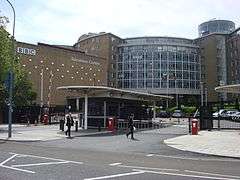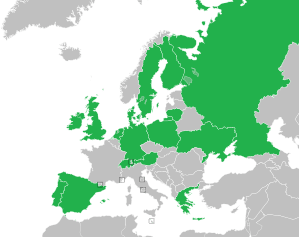Eurovision Dance Contest 2007
| Eurovision Dance Contest 2007 | ||||
|---|---|---|---|---|
 | ||||
| Dates | ||||
| Final | 1 September 2007 | |||
| Host | ||||
| Venue | BBC Television Centre,[1] London, United Kingdom | |||
| Presenter(s) | Graham Norton Claudia Winkleman[1] | |||
| Director | Nikki Parsons | |||
| Executive supervisor | Tal Barnea | |||
| Executive producer |
| |||
| Host broadcaster | British Broadcasting Corporation (BBC) | |||
| Interval act | Enrique Iglesias | |||
| Participants | ||||
| Number of entries | 16 | |||
| Debuting countries | 16 (all)
| |||
| Participation map
| ||||
| Vote | ||||
| Voting system | Each country awards 1-8, 10, and 12 points to their 10 favourite acts. | |||
| Nul points | | |||
| Winning dancers | Katja Koukkula & Jussi Väänänen | |||
| Eurovision Dance Contest | ||||
| ||||
The Eurovision Dance Contest 2007 was the 1st Eurovision Dance Contest a dance entertainment co-production between the European Broadcasting Union (EBU) and the BBC. The first ever pan-European dance competition was held on 1 September 2007 in London, United Kingdom with the participation of 16 countries. Viewers cast their votes by telephone and SMS text message voting on each couple's two dances – the first being ballroom or Latin with the second being freestyle, with a "national" flavour. Comedian Graham Norton and Claudia Winkleman presented the 2007 contest from the BBC Television Centre in London.
The first ever winner of the contest was Finland who received a total of 132 points. 2nd place went to Ukraine, 3rd to Ireland, 4th to Poland and 5th place to Austria and Portugal, who received both 74 points.
Location

The host venue was the BBC Television Centre, White City, London, which opened in 1960. It is one of the most readily recognisable facilities of its type having appeared as the backdrop for many BBC programmes. It remained to be one of the largest such facilities in the world until it closed in March 2013.[2]
Production
The contest was hosted by the BBC,[3] and was a co-production by Splash Media – run by the developers of its successful Strictly Come Dancing format – and sports production house Sunset + Vine – with help from the International DanceSport Federation and in association with the European Broadcasting Union.
The contest was broadcast in English and French languages, although France did not take part.[4] Each broadcaster also had the option of providing its own commentators at the event. UK commentators were Len Goodman and Bruno Tonioli.
Participants
The Croatian broadcaster HRT had expressed an interest in taking part, but pulled out due to costs and scheduling problems.
As well as those countries that took part, Albania, Armenia, Belarus, Bosnia & Herzegovina, Cyprus, Iceland, Israel and Macedonia also broadcast the contest despite not taking part in it, with possibility to join it in 2008.[5]
Due to the forest fires in Greece the Greek national broadcaster ERT did not air the show live and therefore used jury instead of televoting.[6]
Austria and Portugal both finished with the same number of points, however, Austria received points from every other participating nation thus receiving points from more countries than Portugal, hence Austria took 5th place.
| Draw | Country | Dancers | Dance Styles | Place | Points |
|---|---|---|---|---|---|
| 01 | | Denise Biellmann & Sven Ninnemann | Paso Doble and Swing | 16 | 0 |
| 02 | | Mariya Sittel & Vladislav Borodinov | Rumba and Paso Doble | 7 | 72 |
| 03 | | Alexandra Matteman & Redmond Valk | Cha-Cha-Cha and Rumba | 12 | 34 |
| 04 | | Camilla Dallerup & Brendan Cole | Rumba and Freestyle | 15 | 18 |
| 05 | | Kelly & Andy Kainz | Jive and Paso Doble | 5 | 74 |
| 06 | | Wolke Hegenbarth & Oliver Seefeldt | Samba dance and Freestyle | 8 | 59 |
| 07 | | Ourania Kolliou & Spiros Pavlidis | Jive and Sirtaki | 13 | 31 |
| 08 | | Gabrielė Valiukaitė & Gintaras Svistunavičius | Paso Doble and Traditional Lithuanian Folk Dance | 11 | 35 |
| 09 | | Amagoya Benlloch & Abraham Martinez | Cha-Cha-Cha and Paso Doble | 10 | 38 |
| 10 | | Nicola Byrne & Mick Donegan | Jive and Fandango | 3 | 95 |
| 11 | | Katarzyna Cichopek & Marcin Hakiel | Cha-Cha-Cha and Showdance | 4 | 84 |
| 12 | | Mette Skou Elkjær & David Jørgensen | Rumba and Showdance | 9 | 38 |
| 13 | | Sónia Araújo & Ricardo Silva | Jive and Tango | 5 | 74 |
| 14 | | Yulia Okropiridze & Illya Sydorenko | Quickstep and Showdance | 2 | 121 |
| 15 | | Cecilia Ehrling & Martin Lidberg | Paso Doble and Disco Fusion | 14 | 23 |
| 16 | | Katja Koukkula & Jussi Väänänen | Rumba and Paso Doble | 1 | 132 |
Scoreboard
| Wikinews has related news: Finland win first ever Eurovision Dance Contest 2007 held in London |
The following 16 countries took part,[4][7][8] and received the scores shown below.
| Voters | |||||||||||||||||
|---|---|---|---|---|---|---|---|---|---|---|---|---|---|---|---|---|---|
| |
Switzerland | ||||||||||||||||
| Russia | 3 | 10 | 3 | 7 | 6 | 4 | 5 | 4 | 8 | 12 | 10 | ||||||
| Netherlands | 5 | 7 | 2 | 12 | 3 | ||||||||||||
| United Kingdom | 3 | 5 | 7 | 3 | |||||||||||||
| Austria | 7 | 3 | 5 | 2 | 10 | 2 | 3 | 3 | 4 | 6 | 8 | 5 | 5 | 4 | 7 | ||
| Germany | 10 | 5 | 6 | 10 | 7 | 5 | 7 | 6 | 1 | 2 | |||||||
| Greece | 2 | 4 | 1 | 5 | 4 | 5 | 4 | 2 | 1 | 2 | 1 | ||||||
| Lithuania | 1 | 6 | 4 | 12 | 1 | 1 | 6 | 3 | 1 | ||||||||
| Spain | 6 | 2 | 2 | 7 | 12 | 4 | 5 | ||||||||||
| Ireland | 1 | 10 | 7 | 8 | 6 | 3 | 1 | 8 | 5 | 10 | 12 | 3 | 8 | 7 | 6 | ||
| Poland | 4 | 8 | 4 | 7 | 8 | 12 | 1 | 6 | 10 | 4 | 10 | 10 | |||||
| Denmark | 1 | 1 | 6 | 7 | 2 | 3 | 4 | 2 | 8 | 4 | |||||||
| Portugal | 12 | 6 | 8 | 3 | 2 | 8 | 8 | 2 | 12 | 2 | 3 | 6 | 2 | ||||
| Ukraine | 3 | 12 | 10 | 12 | 5 | 6 | 5 | 12 | 8 | 6 | 12 | 6 | 7 | 5 | 12 | ||
| Sweden | 1 | 1 | 7 | 5 | 8 | ||||||||||||
| Finland | 8 | 7 | 12 | 4 | 12 | 4 | 10 | 10 | 10 | 8 | 8 | 10 | 10 | 7 | 12 | ||
12 points
Below is a summary of all 12 points in the contest:
| N. | Contestant | Nation(s) giving 12 points |
|---|---|---|
| 5 | Ukraine | Finland, Lithuania, Poland, Russia, United Kingdom |
| 3 | Finland | Austria, Netherlands, Sweden |
| 2 | Portugal | Spain, Switzerland |
| 1 | Ireland | Denmark |
| Lithuania | Ireland | |
| Netherlands | Greece | |
| Poland | Germany | |
| Russia | Ukraine | |
| Spain | Portugal | |
International broadcasts and voting
Voting and spokespersons
The order in which each country announced their votes was done in order of performance. The spokespersons are shown alongside each country.[9]
-
 Switzerland – Cécile Bähler
Switzerland – Cécile Bähler -
 Russia – Like Kremer
Russia – Like Kremer -
 Netherlands – Marcus van Teijlingen
Netherlands – Marcus van Teijlingen -
 United Kingdom – Kirsty Gallagher
United Kingdom – Kirsty Gallagher -
 Austria – Peter L. Eppinger
Austria – Peter L. Eppinger -
 Germany – Alice Kessler and Ellen Kessler
Germany – Alice Kessler and Ellen Kessler -
 Greece – George Amyras
Greece – George Amyras -
 Lithuania – Lavija Šurnaitė-Kairienė
Lithuania – Lavija Šurnaitė-Kairienė -
 Spain – Jesús Álvarez
Spain – Jesús Álvarez -
 Ireland – Pamela Flood
Ireland – Pamela Flood -
 Poland – Ewelina Kopic
Poland – Ewelina Kopic -
 Denmark – Louise Wolff
Denmark – Louise Wolff -
 Portugal – Marta Leite de Castro
Portugal – Marta Leite de Castro -
 Ukraine – Svetoslav Vlokh
Ukraine – Svetoslav Vlokh -
 Sweden – Ulrica Bengtsson
Sweden – Ulrica Bengtsson -
 Finland – Johanna Pirttilahti
Finland – Johanna Pirttilahti
Commentators
Most countries sent commentators to London or commentated from their own country, in order to add insight to the participants and, if necessary, provide voting information.
-
 Switzerland – Bernhard Thurnheer (SF), Jean-Marc Richard (TSR), Sandy Altermatt (RTSI)
Switzerland – Bernhard Thurnheer (SF), Jean-Marc Richard (TSR), Sandy Altermatt (RTSI) -
 Russia – Anastasia Zavorotnyuk and Stanislav Popov (VGTRK)
Russia – Anastasia Zavorotnyuk and Stanislav Popov (VGTRK) -
 Netherlands – Lucille Werner and Cor van de Stroet (Nederland 1)[10]
Netherlands – Lucille Werner and Cor van de Stroet (Nederland 1)[10] -
 United Kingdom – Len Goodman and Bruno Tonioli (BBC One)
United Kingdom – Len Goodman and Bruno Tonioli (BBC One) -
 Austria – Andi Knoll and Nicole Burns-Hansen [11]
Austria – Andi Knoll and Nicole Burns-Hansen [11] -
 Germany – Peter Urban and Markus Sonyi (Das Erste) [11]
Germany – Peter Urban and Markus Sonyi (Das Erste) [11] -
 Greece – None (NET)
Greece – None (NET) -
 Lithuania – Beata Nicholson and Virginijus Visockas [11]
Lithuania – Beata Nicholson and Virginijus Visockas [11] -
 Spain – Beatriz Pécker and Joana Subirana (TVE1)
Spain – Beatriz Pécker and Joana Subirana (TVE1) -
 Ireland – Michael Flatley and Gillian Norris
Ireland – Michael Flatley and Gillian Norris -
 Poland – Artur Orzech and Zbigniew St. Zasada (TVP2) [11]
Poland – Artur Orzech and Zbigniew St. Zasada (TVP2) [11] -
 Denmark – Nicolaj Molbech and Camilla Miehe-Renard (DR1)
Denmark – Nicolaj Molbech and Camilla Miehe-Renard (DR1) -
 Portugal – Isabel Angelino and Jorge Gabriel (RTP1)
Portugal – Isabel Angelino and Jorge Gabriel (RTP1) -
 Ukraine – Timur Miroshnychenko and Oleksandra Myshko (Pershyi Natsionalnyi)[12]
Ukraine – Timur Miroshnychenko and Oleksandra Myshko (Pershyi Natsionalnyi)[12] -
 Sweden – David Hellenius and Tony Irving (TV4)
Sweden – David Hellenius and Tony Irving (TV4) -
 Finland – Sirpa Suutari-Jääskö and Jaana Pelkonen (YLE TV2)
Finland – Sirpa Suutari-Jääskö and Jaana Pelkonen (YLE TV2) -
 Belarus (Non participating country) – Dmitry Karas and Vladimir Parakhnevich[11]
Belarus (Non participating country) – Dmitry Karas and Vladimir Parakhnevich[11] -
 Bosnia and Herzegovina (Non participating country) – Dejan Kukriñ[11]
Bosnia and Herzegovina (Non participating country) – Dejan Kukriñ[11] -
 France (Non participating country) – Sylvie Guillem and Julien Lepers (France 3)
France (Non participating country) – Sylvie Guillem and Julien Lepers (France 3) -
 Iceland (Non participating country) – Eva Maria Jonsdottir[11]
Iceland (Non participating country) – Eva Maria Jonsdottir[11]
References
- 1 2 BBC - Press Office - Taking the floor: Eurovision Dance Contest
- ↑ "Dyke accused of conflict of interest over £6m holding in rival TV firm". The Independent. London. 17 January 2000.
- ↑ BBC - Press Office - The last dance for Camilla and Brendan
- 1 2 EBU.CH :: Eurovision Dance Contest
- ↑ Eurovision Dance Contest Òàíöåâàëüíîå Åâðîâèäåíèå
- ↑ http://www.eurovision.tv/addons/dance/news.php#12
- ↑ "Eurovision Dance Contest unveiled". BBC News. 13 April 2007. Retrieved 2 May 2010.
- ↑ http://www.eurovision.tv/addons/dance/news.php News on the running order of the contest
- ↑ Viniker, Barry (30 August 2007). "EDC voting spokespersons announced". ESCToday,com. Retrieved 16 June 2013.
- ↑ http://www.dansschoolvandestroet.nl/archief.htm
- 1 2 3 4 5 6 7 Mikheev, Andy (1 September 2007). "Eurovision Dance Contest 2007". News Archives (in English and Russian). ESCKaz.com. Retrieved 9 June 2013.
- ↑ "Юлія Окропірідзе та Ілля Сидоренко стали другими у Європі!". NTU. Archived from the original on October 30, 2007. Retrieved 12 June 2013 (archived by Wayback Machine). Check date values in:
|access-date=(help)
External links
- Official Eurovision Dance Contest website
- EBU Press Release
- International DanceSport Federation official website
- Splash Media's website
- Sunset+Vine's website
- ESCKaz pages on Dance Contest (English/Russian)
- YouTube video on Jussi Väänänen's and Katja Koukkula's winning dance

